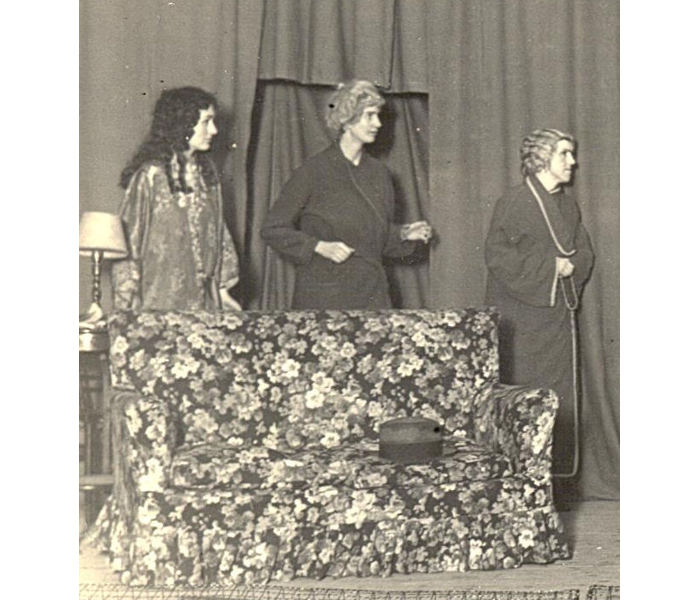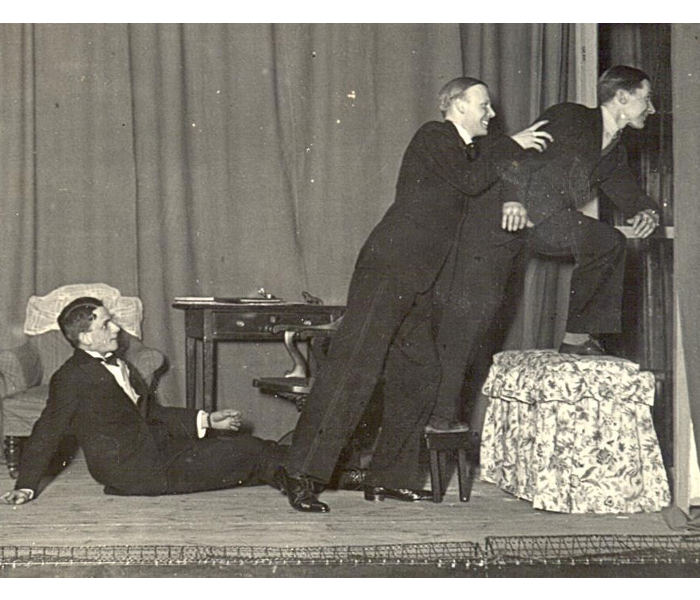PRESS CUTTINGS:
A Double Bill (1932)
THE ROMANTIC YOUNG LADY
TO MEET THE KING
[WEST MIDDLESEX GAZETTE, 23 April 1932]
PERT SPANISH WIT
Two Productions by The Questors
NOT "ORDINARY " PLAYS
The Questors, that thriving local amateur dramatic society, are to be congratulated in not being "ordinary" in their productions, given in St Martin's Hall, West Acton, on Friday and Saturday evenings, when a Spanish play, The Romantic Young Lady, and a one-act curtain raiser, To meet the King were presented.
Pert yet pleasant shafts of humour were delivered in The Romantic Young Lady, although it was obvious that some of the witticisms did not appeal to the flavour of an English audience. The story was of the simplest—an intelligent school boy could have seen through it before the end of the first act. It is one of those charming inconsequential plays that one soon forgets because there is nothing by which to remember it. Nevertheless, the audience spent a pleasant evening—which is the object and the be-all and end-all of most of the plays of to-day.
If I was the organizing power behind an amateur dramatic society, I should use my endeavours to see that something really worth while was done. The Romantic Young Lady was not worth the time or trouble of The Questors.
DYNAMIC ENERGY
The play revolves round two  characters, Rosario, and "The Apparition." In the former role, Marjorie Seager showed that she is quite capable—indeed, very capable. She possesses that rare gift among amateur artistes of real dramatic fire. When Rosario was in a stage temper, she was in a real stage temper. It was quite a difficult role, one of changing moods and shifting feelings. Her voice, too, has a charm of rare quality, which, perhaps, was only to be expected in an actress of such dynamic energy. It was an excellent characterization, and one with which Marjorie Seager can be well pleased.
characters, Rosario, and "The Apparition." In the former role, Marjorie Seager showed that she is quite capable—indeed, very capable. She possesses that rare gift among amateur artistes of real dramatic fire. When Rosario was in a stage temper, she was in a real stage temper. It was quite a difficult role, one of changing moods and shifting feelings. Her voice, too, has a charm of rare quality, which, perhaps, was only to be expected in an actress of such dynamic energy. It was an excellent characterization, and one with which Marjorie Seager can be well pleased.
John Ruck was good in a role that called for pleasant light heartedness and an airy, cheeky manner. He was "The Apparition,"  who was really the famous author whom Rosario wanted to meet. Mr. Ruck was quite successful in being the foil on whom Rosario's moods and jealousies—as shifting as the sea sands—flung themselves in vain.
who was really the famous author whom Rosario wanted to meet. Mr. Ruck was quite successful in being the foil on whom Rosario's moods and jealousies—as shifting as the sea sands—flung themselves in vain.
The Questors are fortunate in having two such accomplished players.
The rest of the cast was of little importance. It was unfortunate that Mabel Frere was suffering from influenza, and was unable to play the part of Dona Barbarita, the grand-mother. Barbara Sharp, at 24 hours' notice, undertook this part as well as that of Irene, the secretary. Miss Sharp deserves the highest commendation for her work, for Dona Barbarita had quite a lot to say,
OTHER PARTS
Frank Cockburn also had two parts to play, that of Mario and Don Juan. Mario was Rosario's brother, and the parts of the other brothers, Pepe and Emilio, were played by Frank Emmet and Cyril Thomas. The three brothers were not as real or as lively as their sister.
A. Copnall had a lot of hard things to say as Maria Pepa, the servant, which was a part intelligently acted. Dolly Browne was Amalia, the type of girl any one would willingly kick downstairs, and E S Taylor was seen as Guillermo, the butler.
The play was produced by Phillip Woollcombe, who did quite well, considering the lack of amenities of St. Martin's Hall.
In the one act play To meet the King neither the writer nor the players seemed to have grasped fully the depths of the subject. A supernatural play always requires very careful acting, and The Questors lacked this. Everyone seemed so ordinary, in spite of the fact that extraordinary things happened. Gwendolyn Thomas was good as the mother. Other parts were taken by Doreen Barnard (the nurse), T S Saunders (Ronnie), and E S Taylor (the doctor).
Alfred Emmet was the producer and stage manager.
JER
.
